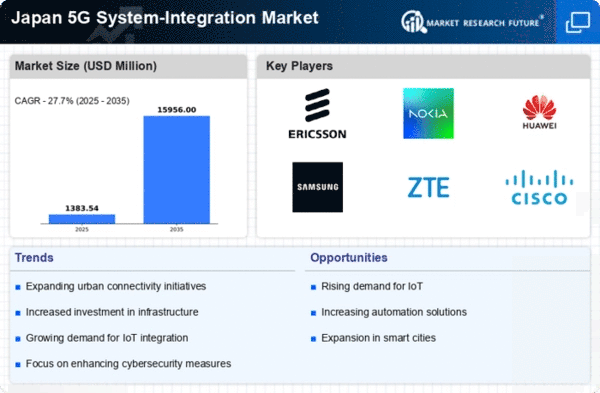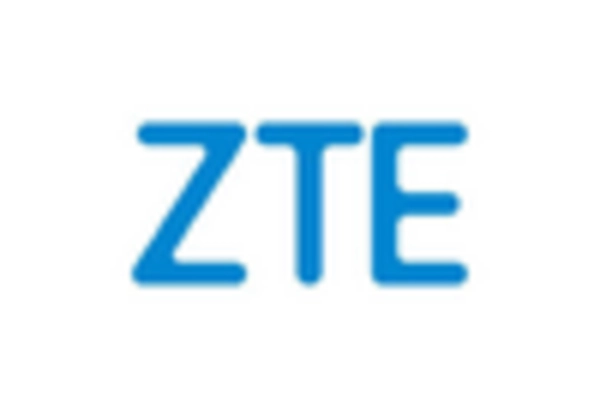Emergence of IoT Applications
The proliferation of Internet of Things (IoT) applications is significantly influencing the 5G System-Integration Market in Japan. As industries increasingly adopt IoT technologies, the demand for seamless connectivity and low-latency communication rises. The 5g system-integration market is poised to benefit from this trend, as 5g networks are designed to support a vast number of connected devices simultaneously. Reports suggest that the number of IoT devices in Japan could exceed 1 billion by 2025, creating a substantial need for advanced integration solutions. This growth in IoT applications necessitates the development of sophisticated 5g system-integration strategies to ensure efficient data management and connectivity, thereby driving market expansion.
Increased Focus on Cybersecurity
As the 5g system-integration market expands in Japan, the focus on cybersecurity becomes increasingly critical. With the rise of connected devices and the potential for cyber threats, businesses are prioritizing the security of their networks. The integration of robust cybersecurity measures into 5g systems is essential to protect sensitive data and maintain consumer trust. Reports indicate that cybersecurity spending in Japan is expected to grow by 15% annually, reflecting the urgency of addressing these concerns. This heightened focus on security drives demand for specialized integration services that can ensure the resilience of 5g networks against cyber threats, thereby contributing to the overall growth of the 5g system-integration market.
Government Initiatives and Support
Government initiatives play a crucial role in shaping the 5G System-Integration Market in Japan. The Japanese government has been proactive in promoting 5g technology through various policies and funding programs. For instance, the Ministry of Internal Affairs and Communications has allocated approximately $2 billion to support the development of 5g infrastructure. This financial backing encourages private sector investment and fosters innovation in the telecommunications sector. Furthermore, the government's commitment to enhancing digital infrastructure aligns with its broader economic goals, potentially leading to a more competitive landscape for the 5g system-integration market. Such initiatives are likely to stimulate growth and attract new players into the market.
Rising Demand for High-Speed Connectivity
The increasing demand for high-speed connectivity in Japan is a primary driver for the 5G System-Integration Market. As businesses and consumers alike seek faster internet speeds, the need for robust 5g infrastructure becomes evident. According to recent data, the number of 5g subscriptions in Japan is projected to reach 100 million by 2025, indicating a substantial market opportunity. This surge in demand is not only driven by consumer electronics but also by industries such as automotive and healthcare, which require reliable and rapid data transmission. Consequently, telecom operators and system integrators are investing heavily in 5g technology to meet these needs, thereby propelling the growth of the 5g system-integration market.
Advancements in Telecommunications Technology
Technological advancements in telecommunications are a significant driver of the 5G System-Integration Market in Japan. Innovations such as network slicing, edge computing, and enhanced mobile broadband are transforming how data is transmitted and processed. These advancements enable more efficient use of network resources and improve overall service quality. As telecom companies adopt these technologies, they require specialized integration solutions to optimize their 5g networks. The market is likely to see increased demand for system integrators who can provide tailored solutions that leverage these advancements, thus fostering growth in the 5g system-integration market. The continuous evolution of technology suggests that this trend will persist, further enhancing market dynamics.

















